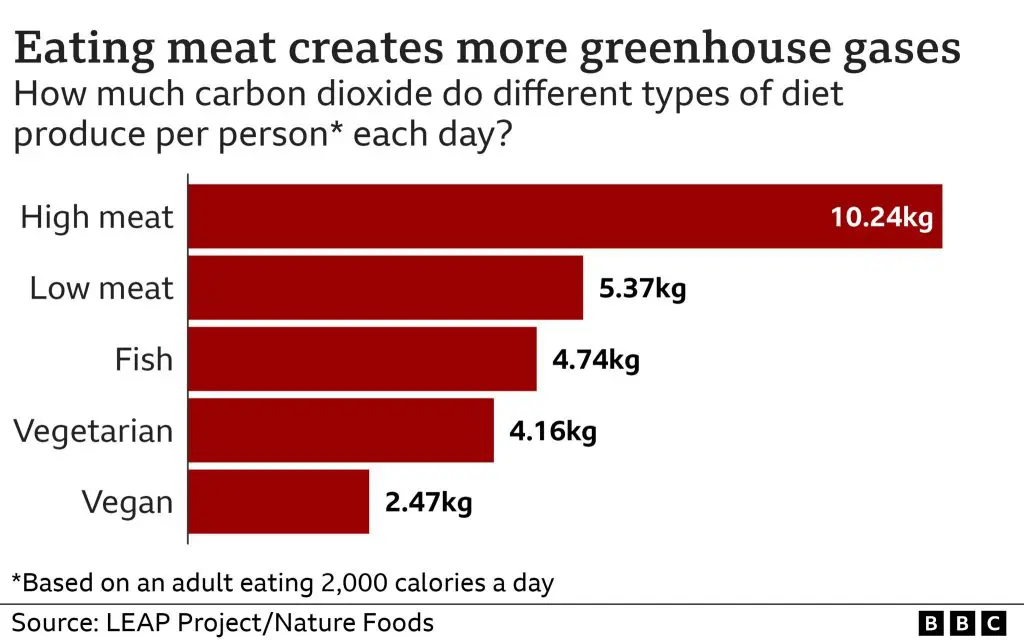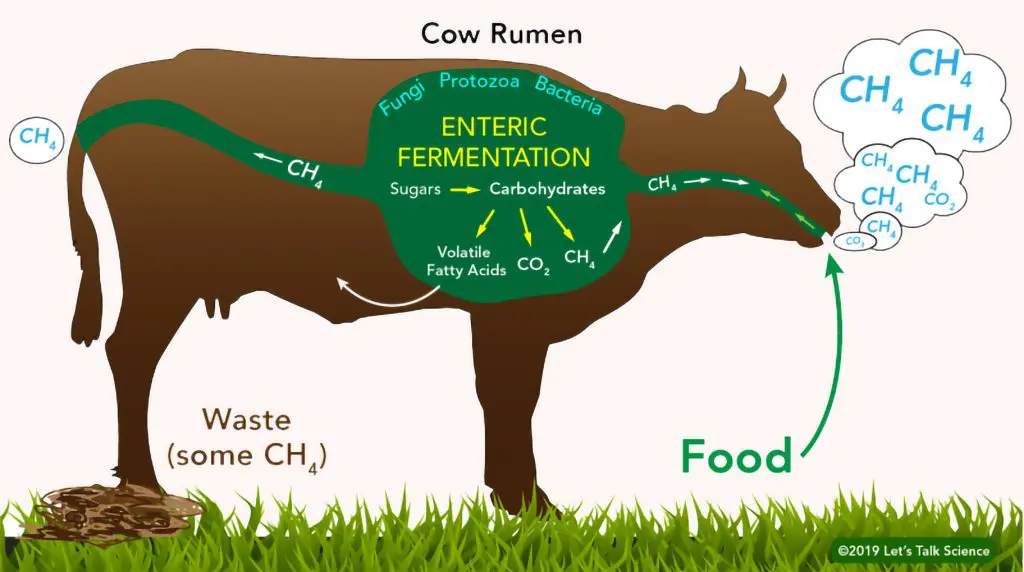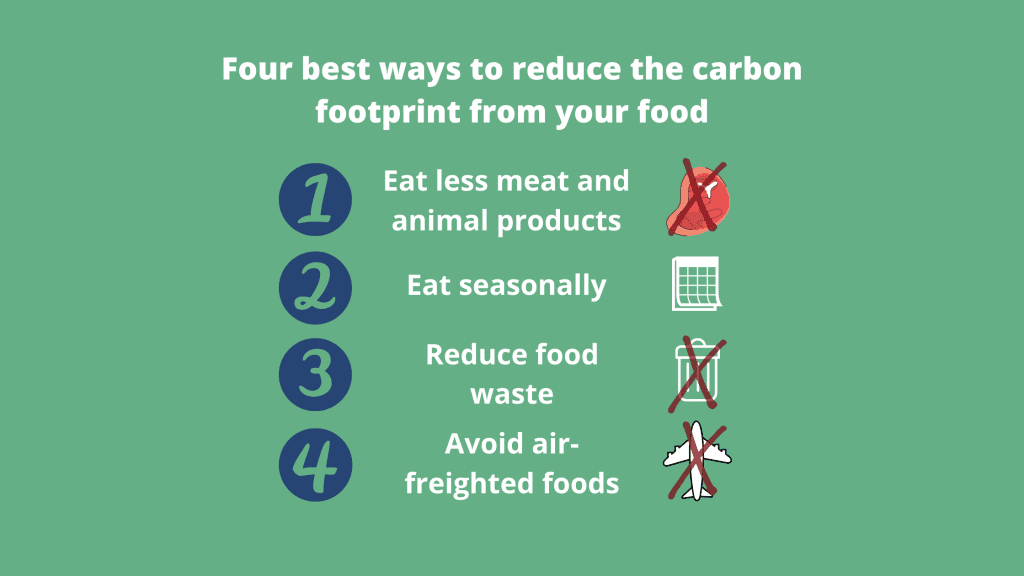We live in a world where sustainability and environmental consciousness have become increasingly important topics. As we become more aware of the impact our daily actions have on the planet, one area that often gets overlooked is our food choices. The food industry is responsible for a significant portion of global greenhouse gas emissions, and our diet plays a crucial role in determining our carbon footprint. In particular, the production of meat has been linked to high levels of carbon emissions, contributing to climate change and other environmental issues. On the other hand, plant-based diets have gained popularity as a more sustainable alternative, but how much of a difference does it truly make? In this article, we will dive into the carbon footprint of our plates, comparing the environmental impact of consuming meat versus plant-based foods. Through a balanced and evidence-based analysis, we aim to shed light on the importance of our dietary choices in reducing our carbon footprint and ultimately, protecting our planet. So, let’s take a closer look at the carbon footprint of our plate and how we can make more environmentally responsible decisions when it comes to our food.

Meat-based diets have higher emissions
A detailed comparison of the carbon footprints associated with meat-based versus plant-based diets reveals compelling evidence for the environmental benefits of reducing meat consumption. Research consistently shows that meat production, particularly beef and lamb, significantly contributes to greenhouse gas emissions. The carbon emissions produced throughout the entire lifecycle of meat production, including livestock rearing, feed production, and processing, are substantial. In contrast, plant-based diets have been found to have lower carbon footprints due to the lower energy inputs, land use, and emissions associated with growing and harvesting plants. By adopting a plant-based diet, individuals can make a significant impact in reducing their carbon footprint and mitigating the effects of climate change.
Plant-based diets are more sustainable
Plant-based diets offer a more sustainable approach to food consumption and a way to reduce the carbon footprint associated with our plates. By shifting towards plant-based options, we can significantly decrease the environmental impact of our dietary choices. Plant-based diets require fewer resources, such as land, water, and energy, compared to meat-based diets. This reduction in resource consumption contributes to the preservation of ecosystems, helps conserve water, and reduces deforestation for agricultural purposes. Additionally, plant-based diets minimize pollution caused by the intensive livestock industry, including the release of methane and other harmful gases into the atmosphere. By embracing plant-based diets, we can promote a more sustainable and environmentally-friendly food system, ultimately working towards a healthier planet for future generations.
Animal agriculture contributes to deforestation
Animal agriculture plays a significant role in deforestation, contributing to the deterioration of our planet’s forests. The expansion of livestock production requires vast amounts of land for grazing and growing animal feed crops. This expansion often leads to the clearing of forests, resulting in the loss of critical habitats for countless plant and animal species. The removal of trees for agricultural purposes not only reduces biodiversity but also releases significant amounts of carbon dioxide into the atmosphere, exacerbating climate change. By recognizing the detrimental impact of animal agriculture on deforestation, we can advocate for sustainable farming practices and consider the environmental benefits of reducing our meat consumption. This shift towards more plant-based diets can help reduce the demand for land-intensive livestock production, consequently mitigating deforestation and its associated environmental consequences.
Plant agriculture reduces carbon footprint
A detailed comparison of the carbon footprints associated with meat-based versus plant-based diets reveals the environmental benefits of reducing meat consumption. Plant agriculture, by nature, requires fewer resources and emits lower levels of greenhouse gases compared to animal agriculture. This is primarily due to the more efficient use of land, water, and energy in growing plant-based foods. Research shows that plant-based diets have the potential to reduce greenhouse gas emissions by up to 50% compared to diets heavy in animal products. Furthermore, plants have the unique ability to capture and store carbon dioxide from the atmosphere, contributing to carbon sequestration and combating climate change. By embracing plant agriculture and adopting more plant-based diets, we can significantly reduce our carbon footprint and contribute to a more sustainable and environmentally friendly future.

Plant-based diets decrease water usage.
In addition to their positive impact on carbon emissions, plant-based diets also play a significant role in decreasing water usage. The production of animal-based foods, particularly meat and dairy, requires substantial amounts of water throughout the entire supply chain, from animal rearing to processing. By contrast, plant-based diets have a considerably lower water footprint. This is because plants generally require less water for growth and maintenance compared to livestock. Studies have shown that shifting towards plant-based diets can lead to a significant reduction in water consumption, saving valuable freshwater resources. By embracing plant-based eating habits, not only can we reduce our carbon footprint, but we can also contribute to the conservation of water, promoting sustainable water management practices for a more environmentally responsible future.
Livestock farming emits methane gas
A detailed comparison of the carbon footprints associated with meat-based versus plant-based diets, using data to argue for the environmental benefits of reducing meat consumption, reveals that livestock farming emits significant amounts of methane gas. Methane is a potent greenhouse gas, with a warming potential much higher than carbon dioxide over shorter time periods. Livestock, particularly ruminant animals like cows and sheep, possess digestive systems that produce methane as a byproduct of their digestion process. The release of methane into the atmosphere contributes to global warming and climate change. By reducing our reliance on meat and transitioning towards plant-based diets, we can effectively mitigate the emission of methane gas, thus reducing our overall carbon footprint and helping to combat climate change.

Plant-based diets lower energy consumption
Plant-based diets not only have a positive impact on reducing greenhouse gas emissions, but they also contribute to lowering energy consumption. This is due to the more efficient use of resources in plant-based food production compared to livestock farming. The energy-intensive processes involved in raising, feeding, and transporting animals for meat production require a significant amount of resources, including land, water, and fossil fuels. In contrast, plant-based diets require fewer resources and have a lower energy demand. By choosing plant-based alternatives, individuals can help conserve energy and contribute to a more sustainable and environmentally friendly food system.
Meat production requires more resources
A detailed comparison of the carbon footprints associated with meat-based versus plant-based diets provides compelling evidence for the environmental benefits of reducing meat consumption. This analysis reveals that meat production requires substantial resources, including land, water, and energy, making it inherently less sustainable compared to plant-based alternatives. Livestock farming consumes vast amounts of land for grazing and growing animal feed, leading to deforestation and habitat loss. Additionally, the water footprint of meat production is significantly higher than that of plant-based agriculture, placing strain on limited water resources. Furthermore, the energy-intensive processes involved in raising and processing livestock contribute to higher greenhouse gas emissions. Therefore, transitioning towards plant-based diets can play a crucial role in reducing resource consumption and minimizing the environmental impact of our food choices.
Plant-based diets reduce transportation emissions
Plant-based diets not only offer significant environmental benefits in terms of resource consumption but also contribute to the reduction of transportation emissions. One key factor to consider is the distance that food travels from farm to plate. Plant-based diets often rely on locally sourced fruits, vegetables, grains, and legumes, thereby minimizing the need for long-distance transportation. In contrast, meat production frequently involves the transportation of animals, feed, and processed meat products over significant distances, increasing fuel consumption and emissions. By adopting plant-based diets, individuals can support a more localized and sustainable food system, reducing the carbon footprint associated with transportation and contributing to a greener future.
Choosing plants over meat helps environment
A detailed comparison of the carbon footprints associated with meat-based versus plant-based diets provides compelling evidence for the environmental benefits of reducing meat consumption. Plant-based diets have been found to have significantly lower carbon emissions compared to meat-based diets. This is due to several factors, including the high levels of greenhouse gas emissions associated with livestock production, such as methane from cattle and nitrous oxide from manure management. Moreover, the cultivation of plant-based foods generally requires less land, water, and energy inputs as compared to animal agriculture. By choosing plants over meat, individuals can actively contribute to reducing their carbon footprint and mitigating the environmental impacts of food production.
In conclusion, it is evident that the food choices we make have a significant impact on our carbon footprint. While meat consumption may provide certain health benefits, it is crucial to consider the environmental consequences. By incorporating more plant-based options into our diets, we can reduce our carbon footprint and contribute to a healthier planet. It is up to each individual to make mindful and sustainable choices when it comes to their plates, and together, we can make a positive impact on the environment.
















































